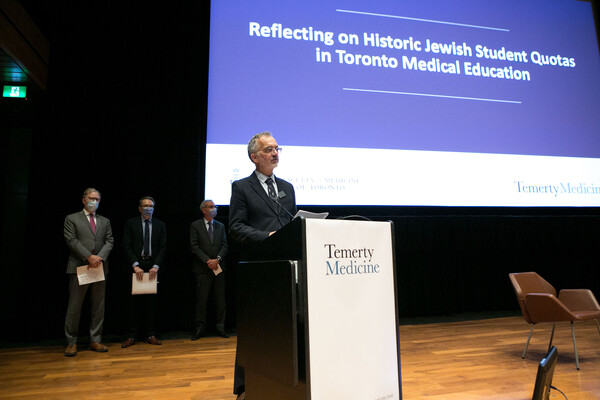Mobile Menu
- Education
- Research
-
Students
- High School Outreach
- Undergraduate & Beyond: Community of Support
- Current Students
- Faculty & Staff
- Alumni
- News & Events
- Giving
- About

 Danielle Martin is still too young to need bifocals, but she often uses the term as an analogy for her medical career.
Danielle Martin is still too young to need bifocals, but she often uses the term as an analogy for her medical career.
“I love weaving back and forth between the micro and the macro. I love patient care and the one-on-one, but I also love a big, tangled-up policy challenge,” says Martin, an associate professor of family and community medicine at the University of Toronto and the 2019 recipient of the F.N.G. Starr Award from the Canadian Medical Association.
Martin certainly found a challenge in 2005 — a heated and divisive debate over the privatization of health care in Canada and whether a two-tier system would solve the country’s challenges. She believed strongly in high-quality, sustainable health care for everyone. And she felt it was critical physicians like her take a stand.
Still in her first year of practice as a family physician, Martin created a national organization called Canadian Doctors for Medicare (CDM). “Many of us were committed CMA members who cared deeply about medicare and felt compelled to organize around our values and what was best for patients,” says Martin, who is also a professor at U of T’s Institute of Health Policy, Management and Evaluation and is vice-president of medical affairs & health systems solutions at Women’s College Hospital.
Martin soon became the “go to” physician on the benefits of universal health care — she debated former CMA presidents and took on pro-private arguments in newspaper, radio and TV interviews over many years. Her colleagues claim Martin’s influence, as leader of CDM, probably prevented two-tier models of care from developing in several provinces. She dedicated seven years to CDM, stepping down in 2013. Today, one of her proudest accomplishments is the fact the organization is still vibrant and active in Canadian health policy debates.
Outside of Canada, she gained global attention in 2014, while presenting to a U.S. Senate committee on the importance of universal medical coverage. In 2017, she took another prominent role, accompanying U.S. Senator Bernie Sanders in announcing his “Medicare for All” plan.
Though she is widely known for her public policy work, Martin is also applying her skills to improve local health organizations. At Women’s College Hospital, her team is implementing programs — like same-day knee and hip replacement — that are reducing wait times, cutting costs and improving patient care.
“Policy only matters to the lives of real people when it’s made concrete and granular in our health system organizations — as clinicians we all want to see the change, we want to make the change,” says Martin. “That’s what bifocal vision is about.”
The CMA announced awards for 10 other people today, including an Award for Young Leaders (Resident) for Dr. Ali Damji, a family medicine resident at U of T based at Credit Valley Hospital, who is also a board director at Resident Doctors of Canada.
Damji's family came to Canada as refugees and relied on the support of neighbours and their community. He says it was an experience he's never forgotten and has built his career on extending the same supports to the medical community.
As past chair of the Ontario Medical Students Association, Damji played a key role in raising awareness of cuts to residency positions and has also become a public advocate for building a better medical culture.
This story is courtesy of the Canadian Medical Association.


